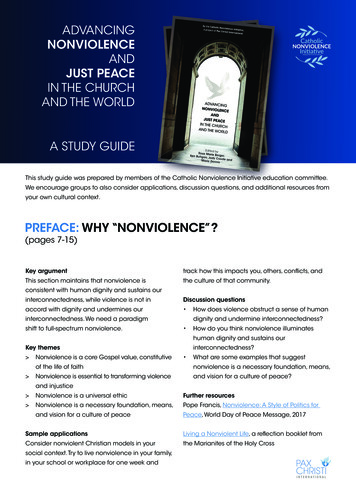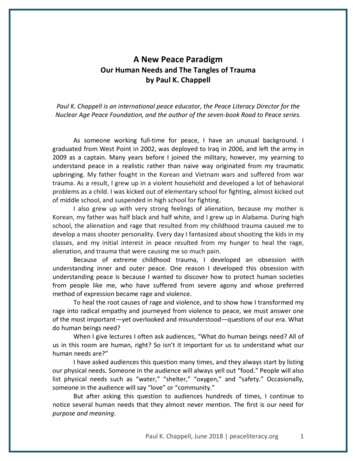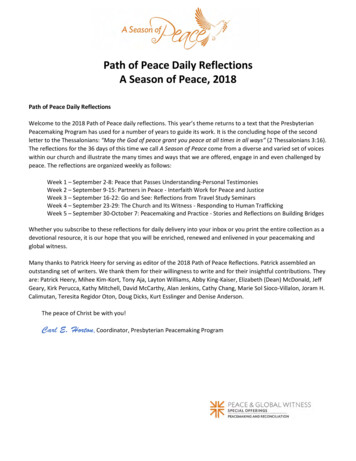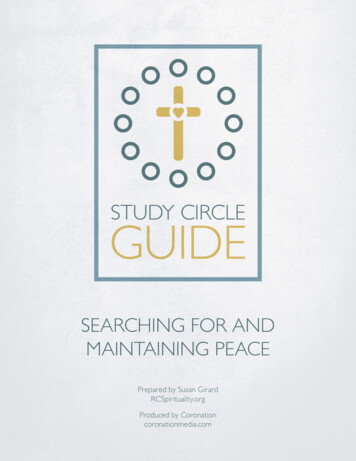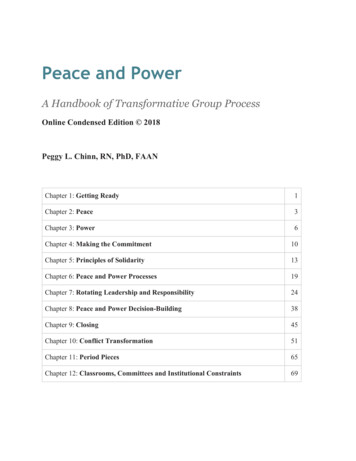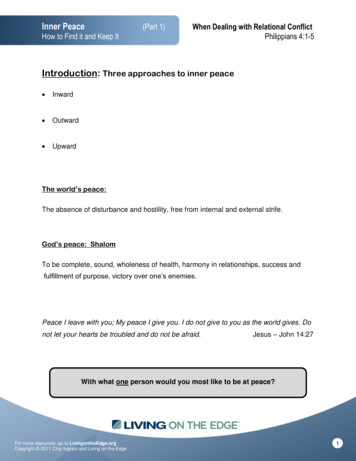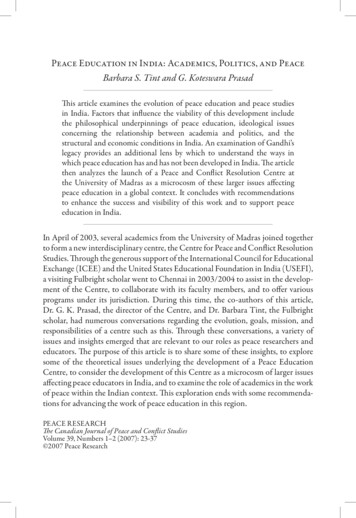
Transcription
Permission is granted toduplicate this publication foreducational purposes orindividual use.This publication is alsoavailable in Braille, largetype or tape version for thesight-impaired. Call or writethe Iowa Department forthe Blind, 524 4th St.,Des Moines, Iowa 50309,515-281-1333.
ByMARIAN A. BRENTON, M.P.A, R.N.Project CoordinatorAndLON N. LARSON, PH.D.Project DirectorDRAKE CENTER FOR HEALTH ISSUESDrake UniversityDes Moines, Iowa 50311Published in Des Moines, Iowaby the Drake Center for Health IssuesRevised and Updated, May 2011A Step-By-Step Guide To Preparing Advance Directive Documents
ADVISORY COMMITTEEREFERENCESThe following individuals served on the AdvisoryCommittee for this project. Their effort, expertise andexperience added depth and accuracy to this publication,for which the Center is most grateful:Primary References:CAROLYN S. ADAMS, M.P.A.,Iowa Department of Public HealthDOUGLAS W. BRENTON, M.D.,Iowa Medical SocietyDEANNA CLINGAN-FISCHER, J.D.,Iowa Department on Agingand the Iowa State Bar AssociationEmanuel LL, Emanuel EJ. “The Medical Directive:A New Comprehensive Advance Care Document.,”Journal of the American Medical Association, June 9, ‘89;261:3290. Copyright 1990. It does not reflect theofficial policy of the American Medical Association.Reprint permission from Drs. Linda L. and Ezekiel J. Emanuel.“Taking Steps To Plan for Critical Health Care Decisions,”Vermont Ethics Network.Other References:REVEREND RANDY EHRHARDT,West Des Moines Christian ChurchGillick MR, Hesse K, Mazzapica N., Medical Technologyat the End of Life: What Would Physicians and NursesWant for Themselves? Archives of Internal Medicine, 1993;153:2542-2547KATHRYN FREILINGERUnityPoint Health – Des Moines“Health Care Powers of Attorney,” Commission on LegalProblems of the Elderly, American Bar Association.KAREN HANSON, J.D.,Iowa Hospital Association“Planning for Incapacity: A Self-Help Guide,” LegalCounsel for the Elderly, Sponsored by the AmericanAssociation of Retired Persons.LISA LACHER, M.A.,Drake University Department of Marketingand CommunicationsMAUREEN MCGUIRE, J.D.,Office of the Attorney GeneralTOM WESTBROOK, PH.D.,Drake University Adult Student Resource CenterGRANT SUPPORTThis project was supported by a grant from the Stateof Iowa and administered by the Iowa Department ofPublic Health. Initial printing costs were supported byUnityPoint Health – Des Moines.
HOW TO USE THIS BOOKLETINTRODUCTIONThe purpose of this booklet is to educate the publicabout advance directives. By doing so, we hope toincrease the use of advance directives, as well as thequality and accuracy of the documents themselves. Thereader is led through a series of steps that ultimatelylead to filling out the advance directive documents in aninformed manner.This educational booklet was produced by the DrakeUniversity Center for Health Issues, a multi-disciplinaryorganization dedicated to public education about economicand ethical issues in health care. It is about making healthcare decisions in advance and creating peace of mind for youand your family regarding these decisions.This booklet can be used in a variety of ways.For example: An individual, couple or family member can use itwhen planning for the future. A health educator or human resources director canuse it in large group education programs. A physician, nurse or health care facility employeecan use it when talking with patients or clients aboutfuture health decisions.You may make as many copies of the bookletitself, the advance directive forms andinstructions, and the values survey asyou need.The Living Will and Durable Power of Attorney for HealthCare forms included in this booklet are meant to beduplicated and used by individuals. Duplicate copies arelegal documents if properly witnessed or notarized. Thevalues survey and medical situation worksheet are notlegal documents themselves, but are intended for usein guiding decision making. For additional copies of thispublication, call or write:Iowa Department on Aging510 E. 12th Street, Suite 2Des Moines, Iowa 50319515-725-3333You may also access a copy online by visiting:www.aging.iowa.govAn effort has been made to answer as many questions ascould be anticipated on the subject of advance directives.If questions remain, we urge you to discuss them withyour health provider or your lawyer.If you suddenly became so ill that you were unable tomake medical treatment decisions for yourself, the burdenof deciding would fall to your family and loved ones. Itis for them that you read this booklet and complete theenclosed advance directive documents.Medical technology can extend life, but the quality of thatlife varies for each person. Decisions about what is tolerablein life and in the dying process are personal and should bemade individually before the opportunity is lost.Advance directives, such as the Living Will and the DurablePower of Attorney for Health Care have grown out ofa desire to maintain individual control over one’s life.These documents work by extending the right of selfdetermination into the future. By recording our choicesnow (as competent persons), we can influence healthcaredecisions made for us in the future.“The Gift of Peace of Mind: For Yourself, For Your Family”is intended for use by health providers when talking topatients about advance directives, as well as by lay personswho wish to complete advance directives as individuals or ingroup settings. It is a detailed guide to the steps involved infilling out advance directive documents. We encourage youto duplicate it for your use.This booklet is intended for informational purposes onlyand is subject to revision if laws should change.
TABLE OF CONTENTSSTEP I: UNDERSTANDINGADVANCE DIRECTIVES. . . . . . . . . . . . . 1-3STEP II: UNDERSTANDING LEGALAND MEDICAL TERMS . . . . . . . . . . . . . 4-5What are advance directives? . . . . . . . . . . . . . . . . . . . . . . . 1Can health care decisions be made forme without advance directives?. . . . . . . . . . . . . . . . . . . . . 1STEP III: VALUES SURVEY. . . . . . . . . . . 6Who can legally complete an advance directive? . . . . . . 1What do you value most about your life?. . . . . . . . . . . . . 6Which advance directive documents are legaland available in Iowa?. . . . . . . . . . . . . . . . . . . . . . . . . . . . . . 1What kinds of mental or physical conditions wouldmake you think that treatments that prolong dyingshould no longer be used?. . . . . . . . . . . . . . . . . . . . . . . . . . 6Do I need to complete both documents?. . . . . . . . . . . . . 2Where can I get a Living Will/Durable Power of Attorneyfor Health Care form?. . . . . . . . . . . . . . . . . . . . . . . . . . . . . . 2How do I complete advance directives? . . . . . . . . . . . . . . 2What should I do with the completed advancedirectives?. . . . . . . . . . . . . . . . . . . . . . . . . . . . . . . . . . . . . . . . 2What if I change my mind? . . . . . . . . . . . . . . . . . . . . . . . . . 2How might your personal relationships andresponsibilities affect your own medical decisions? . . . . 6How do you feel about death and dying?. . . . . . . . . . . . . 6STEP IV: MEDICALSITUATIONS WORKSHEETS. . . . . . . . 7-10What if a doctor is unwilling to comply withmy Living Will or my agent’s decisions? . . . . . . . . . . . . . . 2If I move to another state, will myadvance directives be valid? . . . . . . . . . . . . . . . . . . . . . . . . 3STEP V: COMPLETINGTHE DOCUMENTS. . . . . . . . . . . . . . . 11-17If I am in an accident, how will the police andambulance crews know about my advance directives?. . . . 3Checklist for Completing the Living Will/Durable Power of Attorney for Health Care. . . . . . . . . . 11 Can I be required to sign these documents as acondition for admission to a health care facility? . . . . . . 3Instructions for Completing the Living Will/Durable Power of Attorney for Health Care. . . . . . . . 12-13Do I need an attorney to complete anadvance directive document? . . . . . . . . . . . . . . . . . . . . . . . 3Living Will/Durable Power of Attorneyfor Health Care form. . . . . . . . . . . . . . . . . . . . . . . . . . . . 15-17Who should be my agent?. . . . . . . . . . . . . . . . . . . . . . . . . . 3What if I don’t have anyone to be my agent? . . . . . . . . . 3STEP VI: ADDITIONALINFORMATION . . . . . . . . . . . . . . . . . . . . 19Questions for an agent to ask the medical team. . . . . . 19Notes . . . . . . . . . . . . . . . . . . . . . . . . . . . . . . . . . . . . . . . . . . . 20Wallet card . . . . . . . . . . . . . . . . . . . . . . . . . . . . . . . . . . . . . . 21
STEP I: UNDERSTANDING ADVANCE DIRECTIVESWhat are advance directives?Advance directives are documents that enable youto make decisions now about your medical care inthe future. They offer guidance to your family anddoctors when you cannot speak for yourself, andhelp to assure that your values and important wishesare carried out. There are two advance directivedocuments recognized legally in Iowa.They are explained below.Can health care decisions be made for mewithout advance directives?Yes. If you have not completed an advance directiveand are unable to make decisions, family memberswill make health care decisions for you, after talkingwith your doctors about your condition. However, itis best that these people understand your wishes andvalues. Completing advance directive documents cangive you greater assurance that your wishes will becarried out. They also can give your family memberspeace of mind that they are doing as you wouldprefer.Who can legally complete an advancedirective?Any competent adult (18 years or older) can completean advance directive. A competent adult is onewho has the capacity to understand the nature andpossible results of his or her medical condition and tomake independent decisions regarding treatment.Which advance directive documents are legaland available in Iowa?Iowa law provides two types of advance directives —A Durable Power of Attorney for Health Care anda Living Will. However, these documents can becombined into one form, which is found on pages15-17 of this book.THE DURABLE POWER OF ATTORNEYFOR HEALTH CAREThe Durable Power of Attorney for Health Care is alegal document that allows you to choose someoneas your agent (someone who acts for you) to makehealth care decisions whenever you cannot, due tounconsciousness or loss of ability to think and reason.This agent is required to make decisions accordingto directions you provide in writing or verbally to himor her. If your wishes are not clearly understood anddefined, then your agent will make decisions basedon what he or she believes to be in your best interest.Your agent is given the right to examine your medicalrecords.The Durable Power of Attorney for Health Care mustbe filled out and witnessed while you are still capableof making decisions for yourself. Any incapacity youmay suffer later in your life will then be covered by theDurable Power of Attorney for Health Care.The Durable Power of Attorney for Health Care comesinto play when your doctor has determined that you areunable to make health decisions for yourself, even whenthe situation is temporary, such as after a car accident ora severe, sudden illness. Unlike a Living Will, which is thesecond type of advance directive and is discussed below,the Durable Power of Attorney for Health Care is notrestricted to patients with permanent unconsciousness,with a condition that will lead to their death (oftencalled a terminal or fatal condition) or to decisions aboutprocedures that delay the dying process (life-sustainingprocedures).The following are tasks involved when filling out theDurable Power of Attorney for Health Care: Choosing an agent (someone who acts for you)to make health care decisions for you whenever,in the judgment of your doctor, you are unableto make health care decisions because of loss ofconsciousness or loss of ability to think and reason.As long as you are able to make your own decisionsyou, not your agent, have the authority to maketreatment decisions. Typically, an adult child, aspouse, or a friend is chosen as a health care agent. Making decisions regarding specific healthcare treatments that you do or do not want incertain situations. Having the document witnessed or notarized. Distributing the Durable Power of Attorney for Health Care to the appropriate people. THE LIVING WILL(known in Iowa as The Declaration Relating toUse of Life-Sustaining Procedures.)A Living Will is a document directing your physicianto withhold or withdraw certain treatments (lifesustaining procedures) that could prolong the dyingprocess. This advance directive becomes effective onlyat a point when, in the written opinion of your doctor(confirmed by one other doctor), you are expected todie soon and you are unable to make health decisionsfor yourself (because you are unconscious or unableto think and reason) or you are determined to be1
permanently unconscious (irreversible coma, persistentvegetative state).Do I need to complete both documents?It is up to you. The combined form in this bookincludes both. If you would like to complete just theLiving Will or Durable Power of Attorney for HealthCare, consult your attorney.The Living Will and the Durable Power of Attorney forHealth Care are legal documents that, when consideredtogether, provide a very clear picture of your wishes.Through a Durable Power of Attorney for Health Care,your agent can make all of your health care decisions,even those that would be covered by a Living Will.However, if you know you do not want to have yourdeath prolonged by machines, drugs or treatments,you may also want to sign a Living Will since it providesinformation to your doctor if you don’t have an agent orDurable Power of Attorney for Health Care or your agentis not available.Where can I get a Living Will/Durable Powerof Attorney for Health Care form?Forms and directions can be found on pages 1117. You are welcome to copy these forms to usefor yourself or to give to family and friends. Foradditional copies of this booklet, call or write:Iowa Department on Aging510 E. 12th Street, Suite 2Des Moines, Iowa 50319515-725-3333You may also access a copy online by visiting:www.aging.iowa.govHow do I complete advance directives?As you read this booklet, you will find very detailedinstructions on how to fill out the documents. Afterthey are filled out, your signature must be witnessedor notarized or be legally recognized.Legal requirements for witnessing are the same forboth the Living Will and the Durable Power of Attorneyfor Health Care. Each form must be signed and datedand then, either two people over the age of 18 mustwitness your signature and sign on the lines labeledfor witnesses, or you must get the form notarized.At least one of the witnesses must not be related toyou by blood, marriage, or adoption. If you use a notary,witnesses are not necessary. The following personscannot legally act as a witness for you: Someone who has been appointed as your agent onthe Durable Power of Attorney for Health Care form2 Someone who is treating you as a patient, such asyour doctor or nurse An employee of anyone treating you (includingany employee of your doctor, the hospital, nursinghome or hospice where you may obtain medicaltreatment), unless the employee is also yourrelativeWhat should I do with the completed advancedirectives?Copies must be made and given to family members,your health care agent, your family doctor and, ifappropriate for you, your pastor, priest or rabbi. It isalso important to remember that a copy should betaken to the hospital with you every time you areadmitted, to ensure that hospital staff are aware of it.It is important to communicate with your loved onesand doctors about the existence of your completedadvance directives and about the information theycontain. This will make your family, agent and doctorsmore certain of your wishes and more comfortablemaking decisions for you.Your doctor or nurse can be a very valuable source ofinformation when you have questions about certainmedical treatments. They can help you understandwhat types of situations might arise and what yourtreatment options might be in such cases. Schedule atime to talk with him or her about these concerns.What if I change my mind?You may change or cancel these documents at anytime, regardless of your physical or mental condition.If changes are made in writing, you should put yourinitials and a date by each change, and sign anddate it again at the bottom of the form. Copies ofthe changed advance directives should be made anddistributed as before. If you wish to cancel the form,you must tell your doctor and it’s also a good idea todestroy the document. Iowa law does not require youto cancel either document in writing. It can be doneverbally.Situations and values change as you age and it isimportant to re-evaluate your advance directivesevery year to ensure that they remain accurate.What if a doctor is unwilling to comply with myLiving Will or my agent’s decisions?If, in the future, a doctor or administrator of ahospital or health care facility is unwilling to followyour wishes as recorded in your advance directivedocuments, or as made by your agent, the doctor oraministrator must take all possible steps to arrange to
transfer you to another doctor or facility that iswilling to do so.If I move to another state, will my advancedirective be valid?They should be honored in any state, as they areevidence of your wishes no matter where youare. However, the legal requirements for advancedirective documents vary from state to state. If youwant to be absolutely safe when you move to anotherstate, it is a good idea to complete new documentsthat meet the legal requirements of that state. Thisis also true if you live in another state for a portion ofthe year.If I am in an accident, how will the police andambulance crews know about my advancedirectives?In case you are involved in a car accident in Iowa, oranother state, you should carry a wallet card thatshows that you have signed an advance directive inIowa and how to get in touch with your agent. Thiscannot guarantee that your wishes will be carriedout, but will go far in letting others know of them. Awallet card is included on the inside back cover of thisbooklet.Can I be required to sign these documentsas a condition for admission to a health carefacility?No. A hospital or nursing home cannot refuse toadmit you just because you have not signed a LivingWill or Durable Power of Attorney for Health Care.If any health care facility tries to force you to sign anadvance directive, you should contact:Iowa Department of Inspections and AppealsLucas State Office Building321 East 12th StreetDes Moines, Iowa 50319-0083515-281-7102email: webmaster@dia.iowa.govAll such facilities are required by law, however, to askyou if you have an advance directive and to offer youinformation about them.Do I need an attorney to complete advancedirectives?Who should be my agent?The choice of your agent (known legally as the“attorney-in-fact”) is one of the most important partsof completing a Durable Power of Attorney for HealthCare. Your agent will have direct control over yourhealth if you become unable to make health caredecisions.Therefore, it is necessary that your agent besomeone you trust, and someone who is capable ofunderstanding the responsibilities involved in beinga health care agent. Many people choose a spouseor an adult child, but the agent does not have to be amember of your family. Some people choose a friend,spiritual leader or their personal attorney. Be certainto spend time with the person you appoint ensuringthey understand in detail your values and specificmedical treatment wishes. The values survey andmedical situation worksheet included in this bookletcan be very valuable tools when talking about theseissues.In Iowa, the following persons cannot beappointed as an agent: Someone who is treating you as a patient, such asyour doctor or nurse An employee of anyone treating you (including anyemployee of your doctor, or the hospital, nursinghome or hospice where you may obtain medicaltreatment), unless the employee also is yourrelative.What if I don’t have anyone to be my agent?It may happen that you are unable to find an agent.Without an agent, you cannot execute a DurablePower of Attorney for Health Care. In that case, youshould do the following: Complete just a Living Will by consulting yourattorney. Review the values survey and complete themedical situations worksheet. Be sure to talk to your doctor and give him/hera copy of the Living Will. Give copies to familymembers. Also, take copies of all of these with youeach time you are admitted to the hospital.No. An attorney is not necessary to legally completethese documents. However, it is important that theybe completed correctly. Having an attorney involvedmay give you peace of mind. You also may wish tocontact your attorney with any questions or concernsabout the effect of these documents.3
STEP IIUNDERSTANDING LEGAL AND MEDICAL TERMSThe following glossary of medical and legal terms, while accurate, is explanatory in nature and should not beconsidered as legal definitions. For further information, contact your physician or attorney.Advance Directive –A general term for legal documents (such as a Living Will ora Durable Power of Attorney for Health Care) that state aperson’s wishes for medical treatments in case he or she isnot able to make his or her own decisions.Agent –Someone who acts for you; the same as “attorney-in-fact.”Antibiotics –Drugs given to fight infection. The most common types oflife-threatening infections in critically ill patients includepneumonia and urinary tract infections (kidney or bladder).Artificial Provision of Nutrition and Fuids(“Tube Feeding”) –Used either temporarily or permanently to feed patientswhen they are unable to swallow. There are three ways tofeed patients artificially: A tube inserted through the nose and down to thestomach (nasogastric tube) A tube inserted through the stomach wall with surgery(gastrostomy tube) Tubes placed into veins in the arms or the chest(intravenous tubes or IVs)Iowa law permits persons to refuse tubefeeding, just as they may refuse other medicaltreatments.Cardiopulmonary Resuscitation (CPR) –The procedure used when someone whose heart and/orbreathing have stopped is brought back with the followingactions: Pressing on the chest to squeeze the heart so that bloodbegins to circulate again Mechanical breathing (or other artificial breathing with amouthpiece or tube and a bag) to push air into the lungs Electrical shocks to the chest to start the heart beatingagain (defibrillation) Medications given through a vein or directly into theheart4The best results from CPR occur in a generallyhealthy person whose heart stops suddenly.If CPR is started quickly, it can save a person’slife and prevent damage to the body’s tissuesand organs. On the other hand, permanentbrain damage is common if more than about 4minutes have gone by before CPR is started.Coma –A sleep-like (eyes closed) condition resulting from damageto the brain from an accident or a disease. A coma can betemporary (with either complete or partial recovery) orpermanent.Comfort Care –Care to keep someone as comfortable as possible, includingpain medication, lip ointment and ice chips, turningand positioning of the body frequently (or using specialmattresses) to prevent bed sores, and bathing. This type ofcare eases the dying process but does not stop it.Competent –A competent person is one who has the capacity tounderstand the nature and possible results of his orher medical condition and to make their own decisionsregarding treatment.Declarant –A person who is making a statement about their wishes, ora declaration, in a legal document.Do-Not-Resuscitate (DNR) –A DNR order is not the same thing as having an advancedirective. If you want to avoid CPR, your doctor must writea separate order on your chart for each admission.Hospitals and some nursing homes willautomatically attempt CPR (see definition) onanyone whose heart and/or breathing stops,unless there is a “Do-Not-Resuscitate” or “DNR”order on file for the patient. A DNR order (alsocalled a “no code”) can be written by a doctorwith permission of the patient, his or her healthcare agent, or the family.Durable Power of Attorney for Health Care –A document that allows you to appoint another person(called your agent or attorney-in-fact) to make medicalcare decisions for you if you are unable to make your owndecisions. There is a copy of one that is legal in Iowa, alongwith directions for filling it out, on pages 11-17.Execute –To follow the guidelines set down in law for completinga document so that it is legal and enforceable. This mayinclude having witnesses attest to your signing of thedocument.Fatal (Terminal) Condition –See “terminal condition”.
Informed Consent –Agreeing to a plan of treatment after you or your agenthave been given information about your medical conditionand the treatment options.Life-Sustaining Procedures –Drugs, medical equipment, or treatments that can keeppeople alive who would otherwise die within a short,although uncertain, length of time.Living Will –A document, known in Iowa as the Declaration Relating toUse of Life-Sustaining Procedures, that gives your attendingphysician direction to withhold or withdraw procedures thatmerely prolong the dying process and are not necessary forcomfort or freedom from pain. There is a copy of one that islegal in Iowa, along with directions for filling it out, on pages11-17.Mechanical Breathing –Breathing by a machine (ventilator or respirator) when apatient is unable to do so for themselves. This is done byinserting a tube into the windpipe through the nose ormouth (endotracheal tube), or through a hole cut in thewindpipe at the front of the neck (tracheostomy). Theendotracheal tube is the more uncomfortable because itprevents the patient from talking and eating, and causesa gag reflex. The tracheostomy requires surgery, but canallow the patient to eat and talk when they are off therespirator for short periods of time. This type of machine isvery useful for emergency situations.Medical Technology –The equipment and treatments doctors use to diagnoseand fight disease, treat injuries or maintain a patient’smental or physical condition. Some examples are surgery,CAT scans and other x-ray procedures, drugs and heartbypass machines.Out-of-Hospital Do-Not-Resuscitate (DNR) –In 2002, a law passed which allows terminally ill adultsto make non-resuscitation decisions in out-of-hospitalsettings. Previous to this law, terminally ill patients outsidea hospital setting, could not be certain their end-of-lifedecision to not be resuscitated would be honored becausethere were no uniform guidelines for Emergency MedicalServices (EMS) and other providers to follow. The Out ofHospital Do-Not Resuscitate (OOH DNR) law directs EMSproviders and other health care providers not to performunwanted resuscitation.The law allows terminally ill patients to have theirphysicians prepare and sign an “Out of Hospital Do-NotResuscitate: (OOH DNR) order.” The OOH DNR order is aphysician’s order authorizing health care providers to allowa patient’s wishes not to be resuscitated in an outside thehospital setting. The out-of-hospital setting may includea health care facility, a hospice setting or the patient’sown home. Resuscitation is any medical intervention thatutilizes mechanical or artificial means to sustain, restore,or supplant a spontaneous vital function, including but notlimited to chest compression, defibrillation, intubation,and emergency drugs intended to alter cardiac functionor otherwise sustain life. Patients will still receive comfortcare, including pain medication.The law also recognizes uniform OOH DNR identifiers such asa standard necklace or bracelet obtained through Medic Alert.For more information on OOH DNR contact the IowaDepartment of Public Health, Bureau of EmergencyManagement Services (EMS) at 1-800-728-3367 orwww.idph.state.ia.us/emsPain Medication –Medications that relieve pain resulting from injury ordisease. They are a very important part of comfort care (seedefinition). These medications may have adverse side effects.They may also interfere with breathing in very ill patients.These side effects can indirectly shorten life.Persistent Vegetative State (PVS) –A state of permanent unconsciousness that is not curable.It may take up to three months to be certain of a diagnosisof PVS. In patients with PVS, the centers in the brain thatcontrol thinking, speaking, hunger and thirst have beendestroyed. PVS patients still have reflexes, such as aimlesseye and muscle movements, yawning, coughing, andresponses to touch or sound. Current medical knowledgeindicates that they do not feel pain. This diagnosis includespatients who appear to be awake at times, but does notinclude those who are in a deeper coma with their eyesclosed.Principal –The person who is giving power to make health caredecisions to a health care agent in the Durable Power ofAttorney for Health Care document.Terminal (Fatal) Condition –Iowa law defines a terminal condition as one that isincurable or irreversible, that without the administrationof life-sustaining procedures, will, in the opinion of theattending physician (with confirmation by a secondphysician), result in death within a relatively short periodof time. There is no specific time period identified. Aterminal condition also can be a state of permanentunconsciousness from which, to a reasonable degree ofmedical certainty, there can be no recovery.5
STEP IIIVALUES SURVEYThe following questions can help you assess your values concerning medical and end-of-life decisions. You may usethese questions to discuss your views
A Durable Power of Attorney for Health Care and a Living Will. However, these documents can be combined into one form, which is found on pages 15-17 of this book. THE DURABLE POWER OF ATTORNEY FOR HEALTH CARE The Durable Power of Attorney for Health Care is a legal document that allows you to choose someone
